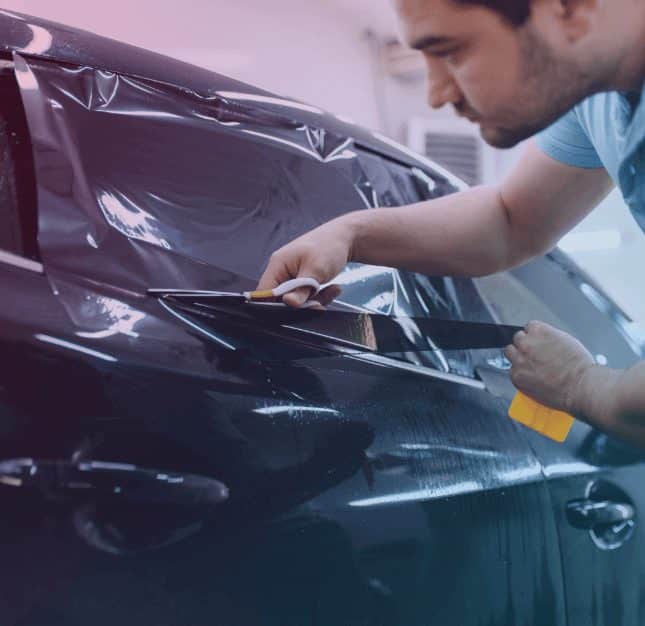Davinci of Michigan Window Tinting: Reducing Glare Without Sacrificing Light
A Comprehensive Guide to Solutions Used With Home Window Tint Solutions
Home window tinting has become an important solution for both business and domestic settings. It offers numerous films created to satisfy certain demands, such as warmth reduction and privacy improvement. Recognizing the variety of alternatives available is essential for making educated choices. This overview will discover the various types of window tinting movies, their advantages, and the installment process. It will certainly likewise attend to lawful considerations that may impact your options. What factors should one take into consideration before continuing?
Sorts Of Window Tinting Movies
Home window tinting films come in numerous kinds, each made to satisfy specific needs and preferences. The most common kinds consist of colored, metalized, ceramic, and hybrid films. Dyed movies provide a fundamental degree of personal privacy and warm decrease, using a dye layer to absorb warmth. Metalized movies integrate tiny metallic particles, using boosted warmth rejection and glare reduction while additionally adding durability. Ceramic films stick out for their exceptional efficiency, as they block warm without hindering signal transmission, making them ideal for digital tools. Crossbreed films integrate elements of both colored and metalized movies, providing a balance in between aesthetic allure and practical advantages. Each film kind varies regarding light transmission, UV defense, and service warranty choices, permitting customers to select a solution that straightens with their certain needs and style preferences. Comprehending these alternatives is crucial for making an educated choice when thinking about window tinting services.
Benefits of Residential Home Window Tinting
Residential home window tinting deals a series of advantages that boost both comfort and power efficiency in homes. Among the main benefits is the decrease of warm gain, which causes lower power costs by lessening the dependence on air conditioning systems. Additionally, window tinting helps to block hazardous UV rays, safeguarding both citizens and furnishings from sun damages and fading.Moreover, it boosts privacy without jeopardizing natural light, enabling home owners to appreciate their sights while maintaining prying eyes at bay. The application of window film also boosts safety and security by holding shattered glass in position during tornados or accidents, thus lowering injury risks.Furthermore, residential window tinting can add to a much more visually pleasing exterior, as different film options are offered to match different architectural designs. On the whole, these benefits make home window tinting a important and sensible financial investment for homeowners seeking boosted livability and energy efficiency.
Advantages of Business Window Tinting
While many businesses seek ways to enhance their workplace, commercial window tinting gives a wide variety of benefits that can considerably enhance both employee convenience and functional performance. One primary benefit is the decrease of glare, which can considerably boost performance by permitting staff members to function without disturbances from rough sunlight. In addition, home window tinting can help control interior temperatures, resulting in decreased reliance on cooling and lower energy costs.Furthermore, tinted windows provide UV defense, securing staff members and furnishings from damaging rays that can create skin damage and fade materials. This protection not only adds to a much healthier workplace however also extends the life of workplace interiors. Ultimately, commercial home window tinting can improve personal privacy, enabling companies to keep an expert look while reducing outside diversions. In general, these benefits make commercial window tinting an important investment for services aiming to maximize their work space.
The Window Tint Setup Process
An effective home window tint setup process involves several essential actions to guarantee excellent results. At first, the area and windows need to be extensively cleaned up to remove dirt, grease, and any kind of various other contaminants that might influence bond. Next, the tint movie is carefully determined and reduced to fit the particular measurements of each window.Following this, the installer applies a remedy to the glass surface to permit repositioning of the movie prior to it adheres. The film is after that put onto the window, making certain it is devoid of bubbles and wrinkles. As soon as located properly, a squeegee is made use of to eliminate excess water and air.Finally, the edges of the film are cut for a cool coating, and the setup is inspected for high quality. Proper focus to these steps assures the durability and efficiency of the window tint, boosting both appearances and capability.
Maintenance and Treatment for Your Home Window Tint
How can one ensure the long life and appearance of home window tint? Correct maintenance and care are necessary. Initially, it is advised to wait at the very least one month after installment before cleaning the color to allow for proper attachment. Once this duration is over, making use of a soft fabric or microfiber towel can stop scrapes while cleansing. Gentle, ammonia-free cleansers ought to be made use of to avoid damaging the film.Regular inspections of the sides and surface area can help identify any kind of bubbling or peeling off early, permitting prompt repair work. Prevent utilizing abrasive products or severe chemicals that could deteriorate the tint. In addition, car park in shaded areas or using sunshades can decrease UV exposure, further securing the tint's stability.
Lawful Factors To Consider for Home Window Tinting
Lawful factors to consider for window tinting differ substantially throughout different states. Each state has certain guidelines concerning noticeable light transmission limits, which determine just how much light can go through tinted home windows. Additionally, some states offer clinical exemptions, allowing individuals with particular conditions to use darker colors than typically permitted.
Tinting Laws by State
While home window tinting can improve a car's looks and supply extra privacy, it is necessary for vehicle proprietors to understand the varying laws that regulate tinting throughout various states. Each state has its very own particular laws regarding the allowable levels of color darkness, representation, and the kinds of home windows that can be tinted. Some states enable darker colors on rear home windows yet enforce more stringent restrictions on front side windows. Additionally, certain states may need particular tags or certificates to validate compliance. Falling short to stick to these laws can cause fines or the need to eliminate the tint (Davinci of Michigan Window Tinting). Automobile owners must research their state's laws before spending in window tinting solutions.
Noticeable Light Transmission Boundaries
Recognizing the noticeable light transmission (VLT) limits is crucial for anybody taking into consideration window tinting. VLT refers to the portion of noticeable light that can go through the colored glass. Different states have differing guidelines regarding appropriate VLT degrees, particularly for various home windows in lorries. Front windshields usually have more stringent limitations compared to side and rear home windows. Breaching these regulations can cause fines and the demand to get rid of non-compliant tinting. As an outcome, it is essential for people to investigate their state's details VLT laws before continuing with home window color installation. Compliance guarantees not only lawful adherence yet also security and presence while driving, promoting a much safer atmosphere for all roadway customers.
Clinical Exemptions for Tinting

Picking the Right Home Window Tinting Service
Selecting the right window tinting service includes a cautious analysis of individual tinting requirements. It is important to evaluate various service choices, ensuring they line up with the desired results. Additionally, recognizing the lawful regulations governing home window tinting can aid prevent possible issues down the line.
Examining Tinting Demands

Reviewing Service Options

Comprehending Legal Rules
Prior to choosing a window tinting service, people should recognize the lawful guidelines governing tinting in their area, as these laws can vary significantly in between municipalities and states. Each jurisdiction may enforce specific limitations on the allowed color darkness, reflective buildings, and which windows can be tinted. Some states might allow darker tints on rear home windows while prohibiting them on front windows. In addition, policies commonly outline the kinds of products that can be used and may require certain labeling or accreditation. Failure to abide by these legislations can result in fines or the demand to remove the tint. As a result, potential clients must validate the validity of their desired tint and get in touch with professionals accustomed to regional regulations to assure compliance.
Often Asked Questions
The Length Of Time Does Window Tinting Generally Last?
The longevity of window tinting usually ranges from 5 to 10 years, depending upon aspects such as the high quality of the movie, installation process, and ecological conditions. Normal maintenance can likewise affect its lifespan considerably.
Can Home Window Tinting Be Eliminated Conveniently?
The simplicity of home window tint elimination depends on the setup method and adhesive utilized. Commonly, professional solutions guarantee more secure, cleaner elimination, while do it yourself efforts may lead to damage to the glass or adhesive residue.
Will Window Tinting Impact My Home's Resale Worth?
Home window tinting can influence a home's resale value positively or adversely. Potential purchasers might value energy financial savings and personal privacy, while others may view it as an individual choice, impacting general charm and desirability of the residential or commercial property.
Are There Eco-Friendly Window Tinting Options Available?
The query regarding green window tinting options discloses that numerous producers now use items making use of sustainable products. These options can minimize energy consumption and boost comfort while straightening with environmentally conscious practices in home enhancement.
Can Window Tinting Aid With Energy Efficiency?
Home window tinting can significantly enhance power efficiency by reducing heat gain and loss. This aids preserve comfortable interior temperature levels, potentially decreasing cooling and heating expenses, while additionally adding to a more sustainable setting through minimized power consumption. The application of home window movie additionally enhances security by holding shattered glass in location during crashes or storms, therefore view it now reducing injury risks.Furthermore, residential window tinting can add to a much more cosmetically pleasing outside, as various movie choices are offered to match different building styles. Additionally, window tinting can help regulate indoor temperatures, leading to reduced dependence on air conditioning and lower energy costs.Furthermore, tinted home windows supply UV security, securing staff members and home furnishings from harmful rays that can cause skin damage and discolor products. Some states permit darker tints on rear home windows but impose stricter limitations on front side home windows. Prior to picking a home window tinting solution, individuals need to understand the legal guidelines regulating tinting in their area, as these regulations can differ substantially in between states and districts. Some states might permit darker colors on back home windows while forbiding them on front windows.